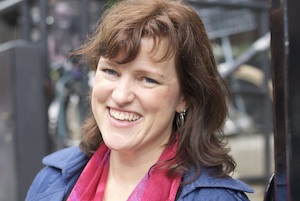08 Feb Smells like new mayonnaise to me: captioning/subtitling music

When I first started captioning, I worked on a team of captioners which peer-reviewed each other’s work. One day, I watched this go by on a co-worker’s show:
I feel like my head is gone
And what the hell is going on
And it smells like new mayonnaise to me
This was the editor’s best guess at the lyrics of the song in his show. His peers stridently encouraged him to contact the producer of the show for lyric confirmation, and we all learned a lot that day. First of all, lyric sheets with producer sign-off are far preferable to guesses. Second of all, it is really worth considering when listening to lyrics (or any other dialogue) whether you are parsing the phonemes correctly. Did you hear “Linda’s farm” or “Lindesfarne”? And ultimately, if it can’t be determined what the lyrics are… they have to be left out. We can’t provide viewers with total nonsense.
I have worked on hundreds, possibly thousands of music videos since then, and we always request lyric sheets, despite my reputation for “spidey senses.” We have had hip-hop video producers tell us that there are no lyrics used in their videos… in which case we ask them for a transcript of the words. Most hip-hop videos would be impossible to caption intelligibly without transcripts provided by the actual artists… but not surprisingly, most videos are not true to their lyric (or word) sheets. We are always filling in blanks.
The hours we have spent researching lyrics are countless. Before we had the internet (I started captioning in 1991), we would go to the library, buy CDs, tapes, albums for liner notes, or call anyone we could think of with our questions. My dad was always particularly helpful. “Hi, Dad, do you know this song: whoa, back buck and gee by the lam? At the end of the line, could he really be saying “Cunningham?” The internet really transformed how we perform our work, but a second (third, fourth) set of ears is still invaluable. On occasion I have had someone else say the phrase we are working on out loud, and then we go through the process of attempting different parsings of the sounds until finally the words start to pop out. Then we go for verification.
In dramas, we always ask producers whether they want lyrics for incidental music included, and if so, we request lyric sheets. And we check for producer and broadcaster preferences. Some producers and broadcasters request that every word of incidental music be included. Some request that incidental music be left out. On many occasions we have captioned, even, to preliminary sound mixes, then completed the captioning to final mixes… discovering that the music has changed. And always when international, pulled-up-blacks, second broadcaster versions, or DVD versions of previously captioned materials come up, we check for music substitution.
Music substitution occurs during the production of a show for obvious creative reasons, like the piece doesn’t fit the tone the director would like to achieve, but there are also possible rights questions for music inclusion. The show may not secure the clearances they need to use the song at all, in which case there may be a last-minute substitution which needs to be updated in the captioning.
As well, a song may be cleared for use for a short period of time, making it unsuitable for inclusion on DVD or in international versions. We have recaptioned entire seasons of dramas, removing the high-profile pop songs they used on first broadcast and replacing them with (generic) instrumental only. Music clearances of incidental music is the reason that WKRP in Cincinnati will not be appearing on DVD any time soon.

We have, however, had requests from clients to leave the captioning off performances in performance shows, captioning only the interview sections of those shows, and we had a lively exchange one time with a broadcaster who supplied us a broadcast of a sung performance all in Latin (sung in four parts! extremely challenging on a number of levels); when we completed the captioning, the broadcaster said that they were expecting something a lot more like [SINGING IN LATIN]. We are still very proud of the captioning for that episode; every word was researched, it was all positioned to indicate the singer, and the interweaving of the captioning of each singer really represents the hear experience. It’s a portfolio piece for us, an also a way of explaining the continuum we operate on sometimes, between the bare minimum amount of information a caption can convey, [SINGING IN LATIN], which at least supplies the language information, which a hearing viewer may or may not have. Word accuracy with timing and positioning supplies the full information, and very few hearing viewers would have all of that in their viewing experience!
The broadcaster was very happy with the job we did for them, by the way, and just had not considered that we might do the… full approach on the captioning of that material.
In my opinion, there is no excuse for not captioning music performed by characters on screen. The basic principle of captioning is to provide the information that a non-hearing viewer would miss but that a hearing viewer would have access to. The time we take to perform the captioning means, however, that we should be able to supply details that a hearing audience might not have time to catch. What Eastern European language was being spoken? What was that phrase again? We can mitigate the effect of accents and timing, foregrounding information that might otherwise be lost.
In captioning, there is no special style, aside from italics, to indicate incidental music, which presents interesting questions. If you caption incidental music, you really foreground what might be more subtle cues to a hearing audience. Some incidental music comments strongly on the action. Sometimes we feel that captioning every word of the incidental music might draw attention to it unduly. I like to consider as a guideline how much strength the song has received in the mix. As with everything in captioning, we are trying to work with the producers and directors to make sure that the entire audience has access to the same information. This is the bottom line and the pride we take in doing the job well.
Kelly Maxwell










